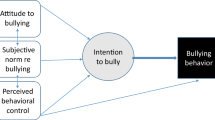Abstract
Principals state that they are continuously engaged in making personnel and programmatic evaluations based on their professional judgments and perceptual measures. Yet, this perspective has been missing from research frameworks conceived by evaluation specialists. The descriptive statements of principals in this study reflect normative expectations and structural constraints, combined with idiosyncratic and discretionary actions. This study attempts to demonstrate how Dewey's general logic of experience helps to explain the epistemological underpinnings of administrators' evaluative perceptions and professional judgments.
Similar content being viewed by others
References
Argyris, C., and Schon, D. (1982).Theory in Practice: Increasing Professional Effectiveness. San Francisco: Jossey-Bass.
Astuto, T., & Clark, D. (1985). The strength of organizational coupling in the instructionally effective school.Urban Education, 19(4), 331–353.
Bogotch, I. (1990). A model of school managerial control: System analysis of processes, behaviors, and indicators. Unpublished doctoral dissertation, Florida International University.
Bogotch, I. (1992). Managerial virtues of necessity and choice. In P. First (ed.)Educational Policy for School Administrators, pp. 260–266. Boston: Allyn & Bacon.
Bogotch, I. (1993). Assessing school practice: From a principal's perspective.Planning and Changing, 23(3).
Clark, D., and Astuto, T. (1988). Paradoxical choice options in organizations. In D. Griffiths, R. Stout, and P. Forsyth (eds.),Leaders for America's Schools: The Report and Papers of the National Commission on Excellence in Educational Administration, pp. 112–130. Berkeley, CA: McCutchan.
Costa, A. (1989). Re-assessing assessment.Educational Leadership 46(7): 2.
DeMoulin, D. (1992, November). The role of the principal in establishing an effective accountability network. Paper presented at the annual meeting of the Southern Regional Council on Educational Administration, Atlanta.
Dewey, J. (1929).The Sources of a Science of Education. New York: Liveright.
Dewey, J. (1939/1970). Philosophy, education, and reflective thinking. In T. Buford (ed.),Essays on Other Minds. Urbana: University of Illinois Press. Previously published in J. Ratner (ed),Intelligence and the Modern World: John Dewey's Philosophy, New York: Modern Library.
Elliot, R. (1972). Reexamining the notion of the universality of educational measurement. Paper presented at the Annual Meeting of the National Council for the Social Studies, Boston.
Fraser, B. (1991). Two decades of classroom environment research. In B. Fraser & H. Walberg (eds.),Educational Environments: Evaluation, Antecedents, & Consequences, pp. 3–28. Oxford: Pergamon Press.
Guba, E., and Lincoln, Y. (1989). Fourth Generation Evaluation. Newbury Park, CA: Sage.
Hale, J., Bogotch, I., and Virtue, J. (1992). In search of the competent school principal: A literature review in support of the Florida Council on Educational Management's 19 Florida Principal Competencies. Unpublished manuscript.
House, E. (ed.). (1973)School Evaluation: The Politics and Processes. Berkeley, CA: McCutchan.
Kirp, D., and Yudoff, M. (1982).Educational Policy and the Law. Berkeley, CA: McCutchan.
Krueger, R. (1988).Focus Groups: A Practical Guide for Applied Research. Newbury Park, CA: Sage.
Meyer, J., & Rowan, B. (1977). Instructional organizations: Formal structure as a myth and ceremony.American Journal of Sociology 83(2): 340–363.
Miles, M. (1981). Mapping the common properties of schools. In R. Lehming and M. Kane (eds.),Improving Schools: Using What We Know, pp. 42–114. Beverley Hills, CA: Sage.
Mintzberg, H. (1971). Managerial work: Analysis from observation.Management Science 18(2): 97–100.
Murphy, J. (ed.), (1990).The Educational Reform Movement of the 1980's: Perspectives and Cases. Berkeley, CA: McCutchan.
Popham, J. (1988).Educational Evaluation. Engelwood Cliffs, NJ: Prentice-Hall.
Popham, J. (1992, February). Keynote address to the Louisiana Educational Research Association, Annual Meeting, Baton Rouge.
Riner, P. (1991). Dewey's legacy to education. In J. Johnson, V. Dupuis, and J. Johansen (eds.),Reflections on American Education: Classic and Contemporary Readings, pp. 152–154. Boston: Allyn & Bacon.
Rusk, R. (1929).The Philosophical Bases of Education. Boston: Houghton Mifflin Co.
Thelen, H. (1969). The evaluation of group instruction. In R. Tyler (ed.),Educational Evaluation: New Roles, New Means, pp. 115–155. The sixty-eighth yearbook of the National Society for the Study of Education. Chicago: University of Chicago Press.
Author information
Authors and Affiliations
Rights and permissions
About this article
Cite this article
Bogotch, I.E., Taylor, D.L. Discretionary assessment practices: Professional judgments and principals' actions. Urban Rev 25, 289–306 (1993). https://doi.org/10.1007/BF01111852
Issue Date:
DOI: https://doi.org/10.1007/BF01111852




